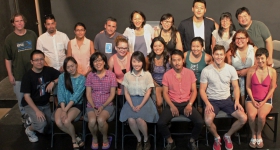Photo provided by Ro Khanna for Congress.
Longtime Democratic Congressman Mike Honda now has an upstart challenger to take his seat in California’s 17th District in 2014. Ro Khanna, a former Deputy Assistant Secretary of Commerce in the Obama Administration, has assembled a team of tech-savvy campaign gurus to challenge Rep. Honda. Many of Khanna’s staff members worked on the Obama campaign, and bring deep experience in using data and analytics to target messages and reach out to voters.
How does your experience as a Deputy Assistant Commerce Secretary shape your view of what US businesses need in order to be globally competitive?
Khanna: It was an incredible honor to serve as the Deputy Assistant Secretary for the Department of Commerce for President Obama. I was able to see how policy impacted American businesses and manufacturers. As part of my work on improving trade relations and export opportunities, I had to work with different agencies in the government. And I realized that only 1 percent of American companies currently export, so there’s a lot we can do to fix the trade deficit. I got to hear the concerns of so many manufacturers around the country, and was able to write a book about what they were telling me we needed to do to improve the economy.
The Federal Government should be investing in ARPA-E (Advanced Research Projects Agency – Energy), in DARPA (Defense Advanced Research Projects Agency), in the National Institutes of Health (NIH) (See "Notes" below). We need to figure out how to unlock capital into low-income areas by reforming our tax code. We need to figure out how to educate the next generation of entrepreneurs and innovators, and overcome the skills gap we currently have.
The government does fundamental research and disruptive innovation very well, and those are things that require 10-to-15-year horizons, and the government is uniquely suited to make investments in cutting edge technology development and research. Congress just hasn’t been paying attention to a comprehensive economic strategy, or a strategy for educating us in the 21st century. That is something that I think my experiences will allow me to have an impact on that type of agenda.
What would your approach be to boost these investments you talk about in our era of austerity?
I will go there with an attitude of working across the aisle, and not being beholden to any special interest groups or any party. I will be focused on what we can do to bring this country together around an economic growth agenda -- what it’s going to take to create jobs for the middle class. I think I can make the case that strategic investments in R&D, combined with tax reform, regulatory reform without lowering standards, and immigration reform, are part of an American economic growth agenda.
It can’t just be additional spending. It’s got to be a more comprehensive approach. We need to make cuts in government programs that don’t bring results, so taking a metrics approach to government policy so that we can look at the return on investment and invest in places that are doing fundamental research and not continuing programs that don’t bring us a return on investment, or are otherwise ineffective.
Are there programs that you think are currently ineffective and need to be cut?
Absolutely. At the Commerce Department, I saw that there were three or four different agencies under the International Trade Administration, where I think there could be consolidation, redundancy avoided. There are eight different agencies doing export promotion. I think consolidation of those and figuring how to make them more efficient would work.
I think we need a wholesale reorganization of [Department of Commerce], Small Business Administration, and Export-Import Bank. The President has talked about that, but I think having champions in Congress to make some of these reforms that will make government more efficient is absolutely necessary.
Are there parts in the immigration bill that you support, and are there things that you wish can be changed?
First of all I’m very happy to see that Congress is finally approaching comprehensive immigration reform. This is long been a priority of mine, and I believe America needs to be welcoming of immigrants. I was excited that there’s a higher cap for H1B visas. The reality is, people who come here on H1B visas help create a lot of other jobs, whether they are administrative jobs, marketing jobs, human resource jobs, or service jobs. They have a multiplier effect.
The places I was disappointed is the elimination of the sibling visa and the reduction of number of visas available to married adult children. This restriction hurts long-standing policy of family reunification and hurts Bay Area residents who want to reunite with their families.
I also was disappointed that the immigration bill didn’t provide equal status and opportunity to people regardless of sexual orientation. It’s important for the LGBT community that they have the same rights in immigration for their significant others as anyone else.
How would you counter the unions’ claims that increasing H1B visas would hurt American workers?
It’s in finding a balance and understanding what type of jobs H1B visa jobs really are. They’re usually [jobs for] advanced computer graduates with very specific skills.
The country has a demand for 120,000 computer graduates a year and we’re graduating only 40,000. So what we need to do is figure out how to invest more in our community colleges and universities to create more computer science graduates, so we don’t have this huge gap. We have to teach young kids codes so they have an aptitude for computers.
These jobs aren’t union jobs. If anything, they may help create union jobs by supporting more building and trades, and development and construction that comes from the expansion of [tech] campuses, by supporting administrative jobs, by supporting human resource jobs.
Can you give us a preview of the innovations that your team is planning for the campaign?
I’m going to run a campaign that uses the most sophisticated tools to empower citizens. They’ll get to express their views in novel ways on the website, and using technology. I’m going to be accessible to folks, doing my own tweeting, and running my own Facebook messages. We don’t have staff here filtering out the direct communication between me and citizens.
We are working with analytics to increase ways of reaching folks who traditionally haven’t voted, increase their registration, have them come out to the polls, which I think will be very healthy for this area. I’m on Twitter every day and I respond to many of our volunteers. I respond to many Facebook messages I get personally. I often respond to texts that volunteers send. The accessibility of modern-day representatives is going to be much more in terms of being connected to their constituents.
If elected, I would tell my House colleagues that this is not about technology. This is about the belief in democracy, and if there are tools that allow elected officials to be more accountable and more accessible to their constituents, that’s a very good thing, particularly in this time of distrust and cynicism.
There’s a taboo in Asian culture of challenging your elders. So why are you challenging Rep. Mike Honda?
I have respect for Mike Honda’s many years of service, but no incumbent Congressman, Democrat, Republican, Asian American, African American, Caucasian, should be immune from competition. That’s part of the problem with politics today. Folks, often with good intentions, get elected to these seats and then think they are feudalist states, where they can remain forever. While the world is going through profound changes, our global economy is extraordinarily dynamic, our politics remain the same. They seem ossified.
The people I speak with in this district feel Congress isn’t working and it’s time for people with new ideas, who are willing to challenge the status quo. It’s not about criticizing the past. It’s about offering dynamism and a new vision for the future. And ultimately, the people of this district will decide whose ideas represent them in Congress.
On the Asian American angle, there has to be a balance between a respect for tradition and the past, and an ability to invent the future. It’s part of what America is all about – taking the best from the old world, our roots, our heritage, respecting that, and yet reinventing it. That’s the ultimate immigrant aspiration. And that balance, about respect for the elderly but also a passion for impacting change, and inventing something new, is the essence of what it means to be American, and I’m deeply proud of this campaign in striking that balance.
Notes:
Advanced Research Projects Agency – Energy (ARPA-E) – An agency at the Department of Energy that invests in cutting edge clean energy technology.
Defense Advanced Research Projects Agency (DARPA) – An agency in the Department of Defense that focuses on developing new technologies for the military.
National Institutes of Health (NIH) – An agency in the Department of Health and Human Services tasked with conducting new biomedical and health-related research.










Comments